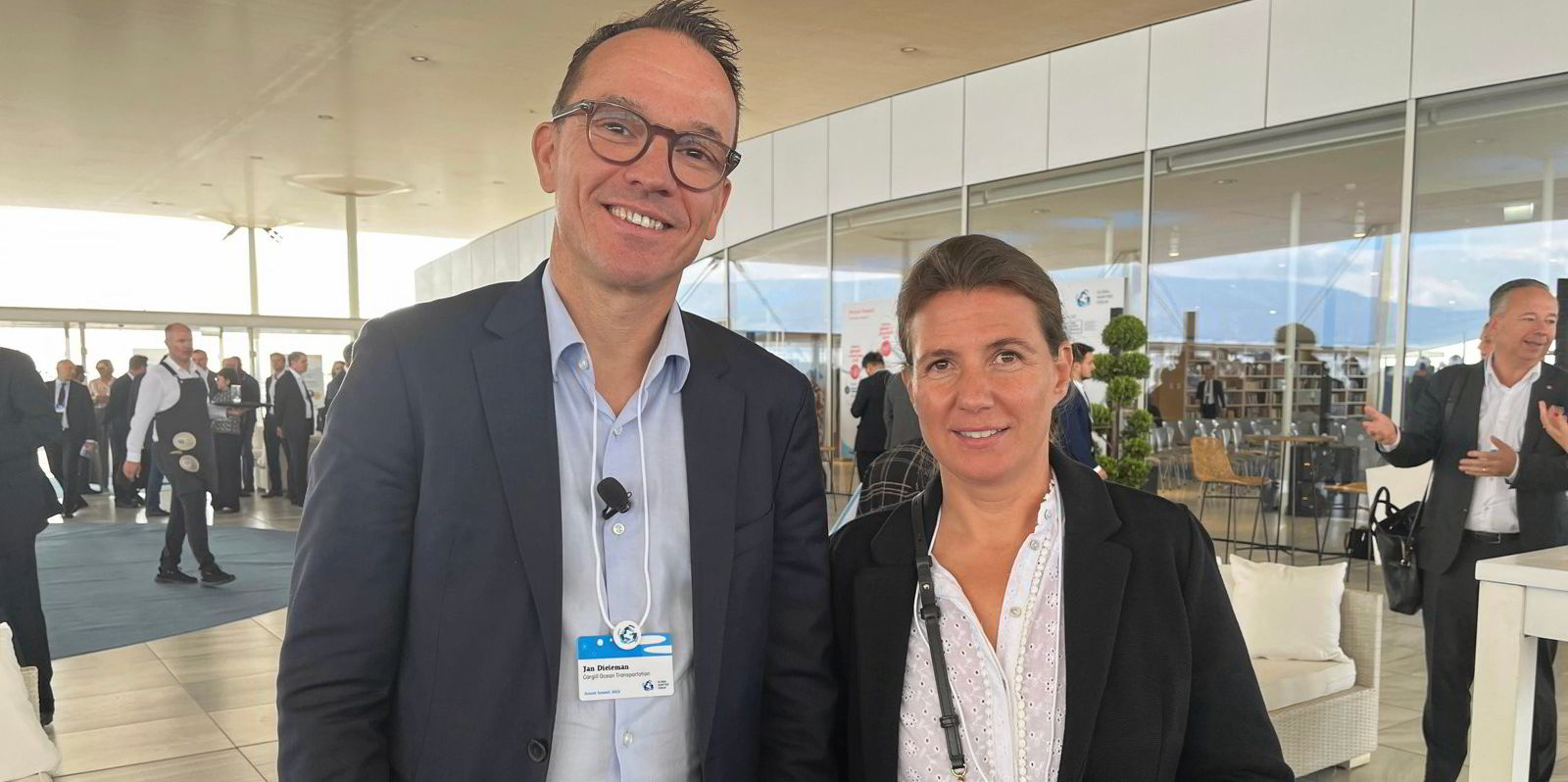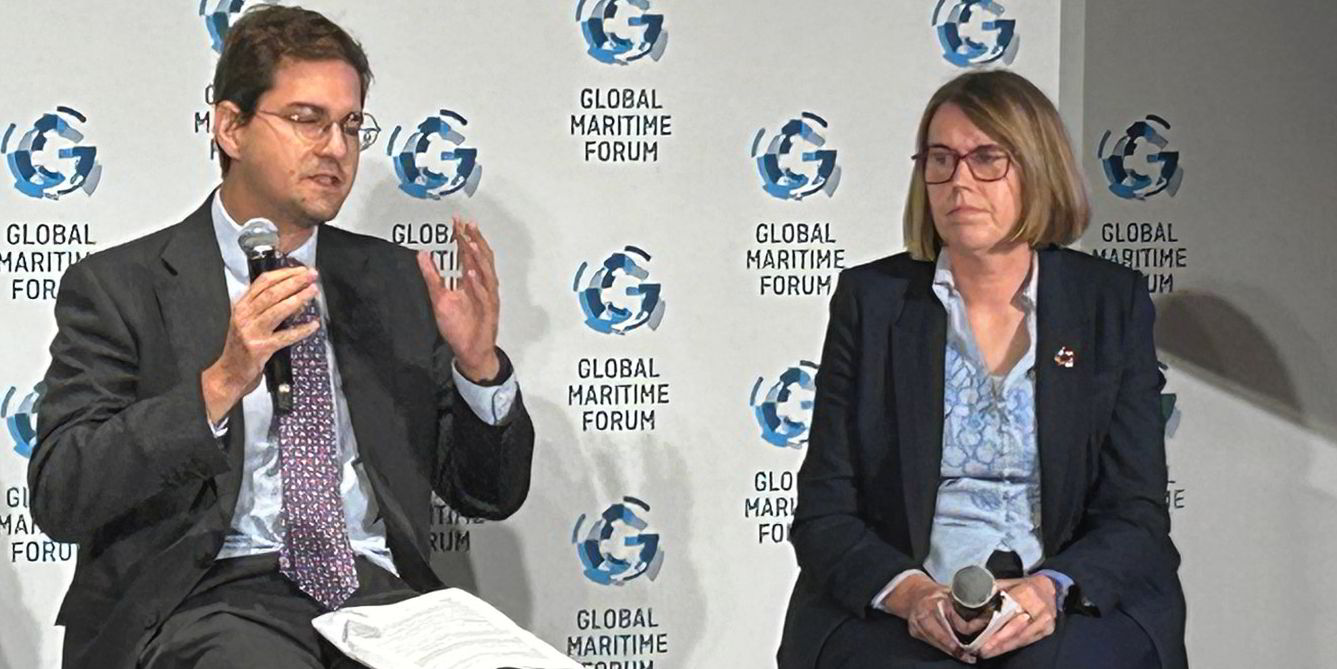A bold decision to host the annual meeting of the sustainability-focused Global Maritime Forum in Athens — a bastion of conservative shipping — has met with a mixed reaction from local Greek shipowners.
Leaders of the forum were pleased that several influential local figures took part and spoke in the opening debate, although, in private, there was talk of an informal boycott from some prominent figures.
The sixth annual forum meeting in Athens follows events in Hong Kong, Singapore, online, London and New York after evolving from the Danish Maritime Forum in Copenhagen.
A not-for-profit organisation focused on sustainable economic development and human well-being, the GMF brings together leading shipowners, charterers, energy majors, equipment manufacturers, academics and other influential figures across the supply chain to debate improving standards.
Chairman Jan Dieleman, head of Cargill Ocean Transportation, said: “When we decided to bring the GMF to Greece 18 months ago, I must admit it was a little uncomfortable.”
“But we’re very happy because we know that there’s a different society here, with a different agenda at times. But this is the place where a lot of things happen.
“For me, it’s the most iconic [shipping] hub that exists in the world, so it’s really, really cool for me to be here and have so many of you with us,” he told a room of nearly 300 executives on the top floor of the Stavros Niarchos conference centre.
Among the Greek owner representatives at the event were Ioanna Procopiou, John Coustas, Semiramis Paliou, Polys Hajioannou, John Platsidakis, Charis Plakantonaki and Paolo Enoizi, but it was only a small slice of the local community.
“I know some people in Athens were very suspicious of the GMF coming to Athens, and they have decided to stay away,” said one local shipowner who did not want to be identified. “But the world is changing, and we need to engage and learn.”
Among the initiatives launched out of the GMF are the Poseidon Principles for banking and insurance, the Sea Cargo Charter for cargo interests and the All Aboard Alliance focused on ship safety.
Participants raised key issues in the opening plenary session focused on the questions over the supply of low-carbon fuels, funding the transition, and hiring and retaining staff.
In the past year, the International Maritime Organization has reset shipping’s decarbonisation target to close to net zero by 2050, which has changed the agenda, said Shell’s senior vice president of shipping & maritime, Karrie Trauth. “We are now going to have to take action. We are beyond ‘ambition’.”
Charis Plakantonaki, chief strategy officer at Star Bulk Carriers, said the IMO’s revised decarbonisation agenda was a “game-changer”. “This is a completely different strategy landscape.”
Tristan Smith, associate professor at UCL Energy Institute, agreed that the IMO decision was a game-changer “in so many different ways”. He highlighted an announcement that the US was putting $1bn in operating grants into the hydrogen economy to drive fuel uptake. Capital grants would not be enough, he said. “That will unlock other governments to say: ‘That’s what we need to do’.”
Hing Chao, chairman of Wah Kwong Maritime Transport Holdings, said shipping’s decarbonisation is vital, as our current behaviour is unsustainable. “For 95% of human history, we have lived in harmony as hunter-gatherers. But to find the answers to the challenges we face, we need questions to be framed in a new way. If we are not asking the right questions, we will not get to where we want to be.”
John Coustas, CEO of Danaos Corp, called on the forum to lift its aspirations to take control of the evolution of regulations. “What we need to ask ourselves is whether we put our mark on these changes. I feel we are just watching what is happening. We have politicians imposing solutions on us. We have to ask ourselves what is it really what we need to do?”
Clare Wright, general manager of shipping & commercial strategy with Shell, said the answer to the challenges is daunting. “We know what needs to be done; the IMO has made that clear. But actually, we’re starting to get some realism about how challenging it is to build out fuelling infrastructure, for example.”
Ioanna Procopiou, owner of Sea Traders, and Trafigura’s Rasmus Bach Nielsen both expressed concern about competition from other industries for low-carbon fuels.
“We are not the only industry that is decarbonising, so there is a lot of competition for the same alternative fuels, and it’s something that we need to bear in mind,” said Procopiou. “There’s a huge lack of fuel.”
Bach Nielsen said that other industries are moving fast, with the German steel industry having been given €3.2bn ($3.37bn) in funding to offtake hydrogen in the last year.
“This is the hydrogen the shipping industry presumably also needs. All the other industries are moving very fast, and I think that’s quite critical to have green fuels available for our industry.”
Procopiou also stressed the need for collaboration. “We need to have commitment from all the stakeholders across the industry, which is the shipowners, the charterers, the shippers, the ports, the receivers, everyone.
“And then there’s the issue of who is going to foot the bill for this transition. We need to have a fair distribution of the burden.”
Both Procopiou and Trauth highlighted the need for skilled staff.
“I’m thinking about the people of the future. I’m thinking about the chronic shortage of seafarers we have today globally, but I am also thinking about the workforce more broadly: who are the shipbuilders of the future? Who are the schedulers of the future? Who are the port workers of the future? And indeed, who are the bankers and lawyers of the future?”(Copyright)





